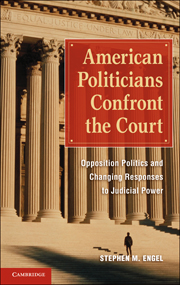 American Politicians Confront the Court
American Politicians Confront the Court Book contents
- Frontmatter
- Contents
- Acknowledgments
- Introduction
- PART I POLITICAL DEVELOPMENT AND ELECTED-BRANCH RELATIONS WITH THE JUDICIARY
- PART II HOSTILITY TO JUDICIAL AUTHORITY AND THE POLITICAL IDIOM OF CIVIC REPUBLICANISM
- PART III HARNESSING JUDICIAL POWER AND THE POLITICAL IDIOM OF LIBERAL PLURALISM
- 6 Clashing Progressive Solutions to the Political Problem of Judicial Power
- 7 A Polity Fully Developed for Harnessing (I)
- 8 A Polity Fully Developed for Harnessing (II)
- On the Return of Opposition Illegitimacy and the Prospects for New Development
- Index
- References
7 - A Polity Fully Developed for Harnessing (I)
A Polity Fully Developed for Harnessing (I)Living Constitutionalism and the Politicization of Judicial Appointment
Published online by Cambridge University Press: 05 June 2012
- Frontmatter
- Contents
- Acknowledgments
- Introduction
- PART I POLITICAL DEVELOPMENT AND ELECTED-BRANCH RELATIONS WITH THE JUDICIARY
- PART II HOSTILITY TO JUDICIAL AUTHORITY AND THE POLITICAL IDIOM OF CIVIC REPUBLICANISM
- PART III HARNESSING JUDICIAL POWER AND THE POLITICAL IDIOM OF LIBERAL PLURALISM
- 6 Clashing Progressive Solutions to the Political Problem of Judicial Power
- 7 A Polity Fully Developed for Harnessing (I)
- 8 A Polity Fully Developed for Harnessing (II)
- On the Return of Opposition Illegitimacy and the Prospects for New Development
- Index
- References
Summary
As reviewed in the previous chapter, in the vacuum created by Progressive failures to connect more directly judicial rulings on constitutional meaning to the shifting passions of quotidian politics, the Court put forth its own solution, one that, in part, abandoned the Jeffersonian construction of judicial independence as political neutrality in favor of the precepts of legal realism. In doing so, the Court cast its role in pluralist democracy as ensuring functional democratic processes, which might require periodically intervening in them. Judicial authority was no longer premised on the Framers' idea of representing the popular sovereign but on an overseer capacity that identified and corrected the potential failings of democracy. Lacking an operational rationale grounded in representative purpose equal to the elected branches, the Court's legitimate authority was without clear mooring. In such circumstance, judges – with the aid of legal scholarship from newly established law schools such as Columbia, Harvard, and Yale – asserted the supremacy of their own interpretation.
This resulting “Great Supreme Court” that could “stand up to both Congress and the states in defense of newly created rights” was epitomized by Earl Warren's stewardship from 1954 through 1968. Liberal Democrats “abandoned their prior fears of conservative or reactionary Courts” and supported the Warren Court, in part, because its rulings progressed in lockstep with a president and a congressional majority that embraced “a comprehensive ideology of Great Society liberalism.”
- Type
- Chapter
- Information
- American Politicians Confront the CourtOpposition Politics and Changing Responses to Judicial Power, pp. 285 - 336Publisher: Cambridge University PressPrint publication year: 2011


